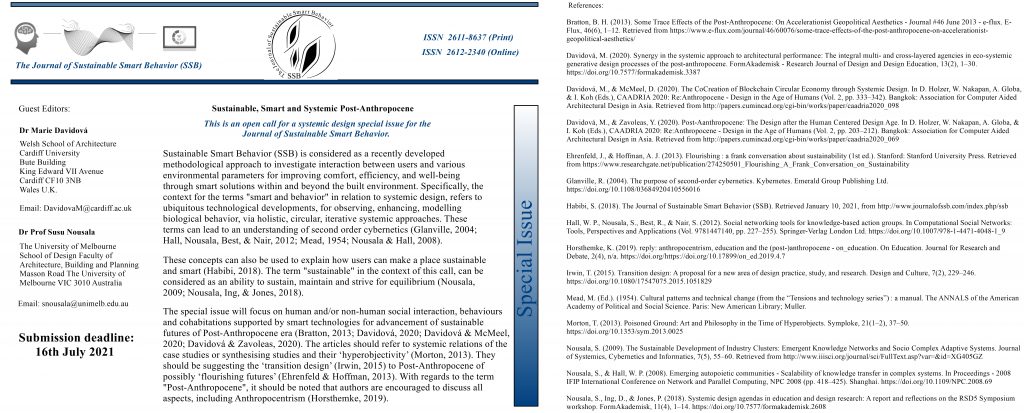
Guest Editor
Dr Marie Davidova
Welsh School of Architecture Cardiff University Bute Building King Edward VII Avenue Cardiff CF 10 3 NB Wales U.K.
Email: DavidovaM@cardiff.ac.uk
Guest Editor
Dr Prof Susu Nousala
The University of Melbourne School of Design Faculty of Architecture, Building and Planning Masson Road The Universitx of Melbourne VIC 2010 Australia
Email: snousala@unimelb.edu.au
This is an open call for a systemic design special issue for the Journal of Sustainable Smart Behaviour.
Sustainable Smart Behaviour (SSB) is considered as a recently developed methodological approach to investigate interaction between users and various environmental parameters for improving comfort, efficiency, and well-being through smart solutions within and beyond the built environment. Specifically, the context for the terms “smart and behaviour” in relation to systemic design, refers to ubiquitous technological developments, for observing, enhancing, modelling biological behaviour, via holistic, circular, iterative systemic approaches. These terms can lead to an understanding of second order cybernetics (Glanville, 2004; Hall, Nousala, Best, & Nair, 2012; Mead, 1954; Nousala & Hall, 2008).
These concepts can also be used to explain how users can make a place sustainable and smart (Habibi, 2018). The term “sustainable” in the context of this call, can be considered as an ability to sustain, maintain and strive for equilibrium (Nousala, 2009; Nousala, Ing, & Jones, 2018).
The special issue will focus on human and/or non-human social interaction, behaviours and cohabitations supported by smart technologies for advancement of sustainable futures of Post-Anthropocene era (Bratton, 2013; Davidová, 2020; Davidová & McMeel, 2020; Davidová & Zavoleas, 2020). The articles should refer to systemic relations of the case studies or synthesising studies and their ‘hyperobjectivity’(Morton, 2013). They should be suggesting the ‘transition design’ (Irwin, 2015) to Post-Anthropocene of possibly ‘flourishing futures’ (Ehrenfeld & Hoffman, 2013). With regards to the term “Post-Anthropocene”, it should be noted that authors are encouraged to discuss all aspects, including Anthropocentrism (Horsthemke, 2019).
Submission Mode
Authors can submit their articles in the following address
http://www.journalofssb.com/index.php/ssb/about/submissions
or send directly to the Guest Editors.
More detailed updates at
References:
Bratton, B. H. (2013). Some Trace Effects of the Post-Anthropocene: On Accelerationist Geopolitical Aesthetics – Journal #46 June 2013 – e-flux. E-Flux, 46(6), 1–12. Retrieved from https://www.e-flux.com/journal/46/60076/some-trace-effects-of-the-post-anthropocene-on-accelerationist-geopolitical-aesthetics/
Davidová, M. (2020). Synergy in the systemic approach to architectural performance: The integral multi- and cross-layered agencies in eco-systemic generative design processes of the post-anthropocene. FormAkademisk – Research Journal of Design and Design Education, 13(2), 1–30. https://doi.org/10.7577/formakademisk.3387
Davidová, M., & McMeel, D. (2020). The CoCreation of Blockchain Circular Economy through Systemic Design. In D. Holzer, W. Nakapan, A. Globa, & I. Koh (Eds.), CAADRIA 2020: Re:Anthropocene – Design in the Age of Humans (Vol. 2, pp. 333–342). Bangkok: Association for Computer Aided Architectural Design in Asia. Retrieved from http://papers.cumincad.org/cgi-bin/works/paper/caadria2020_098
Davidová, M., & Zavoleas, Y. (2020). Post-Aanthropocene: The Design after the Human Centered Design Age. In D. Holzer, W. Nakapan, A. Globa, & I. Koh (Eds.), CAADRIA 2020: Re:Anthropocene – Design in the Age of Humans (Vol. 2, pp. 203–212). Bangkok: Association for Computer Aided Architectural Design in Asia. Retrieved from http://papers.cumincad.org/cgi-bin/works/paper/caadria2020_069
Ehrenfeld, J., & Hoffman, A. J. (2013). Flourishing : a frank conversation about sustainability (1st ed.). Stanford: Stanford University Press. Retrieved from https://www.researchgate.net/publication/274250501_Flourishing_A_Frank_Conversation_on_Sustainability
Glanville, R. (2004). The purpose of second-order cybernetics. Kybernetes. Emerald Group Publishing Ltd. https://doi.org/10.1108/03684920410556016
Habibi, S. (2018). The Journal of Sustainable Smart Behavior (SSB). Retrieved January 10, 2021, from http://www.journalofssb.com/index.php/ssb
Hall, W. P., Nousala, S., Best, R., & Nair, S. (2012). Social networking tools for knowledge-based action groups. In Computational Social Networks: Tools, Perspectives and Applications (Vol. 9781447140, pp. 227–255). Springer-Verlag London Ltd. https://doi.org/10.1007/978-1-4471-4048-1_9
Horsthemke, K. (2019). reply: anthropocentrism, education and the (post-)anthropocene – on_education. On Education. Journal for Research and Debate, 2(4), n/a. https://doi.org/https://doi.org/10.17899/on_ed.2019.4.7
Irwin, T. (2015). Transition design: A proposal for a new area of design practice, study, and research. Design and Culture, 7(2), 229–246. https://doi.org/10.1080/17547075.2015.1051829
Mead, M. (Ed.). (1954). Cultural patterns and technical change (from the “Tensions and technology series”) : a manual. The ANNALS of the American Academy of Political and Social Science. Paris: New American Library; Muller.
Morton, T. (2013). Poisoned Ground: Art and Philosophy in the Time of Hyperobjects. Symploke, 21(1–2), 37–50. https://doi.org/10.1353/sym.2013.0025
Nousala, S. (2009). The Sustainable Development of Industry Clusters: Emergent Knowledge Networks and Socio Complex Adaptive Systems. Journal of Systemics, Cybernetics and Informatics, 7(5), 55–60. Retrieved from http://www.iiisci.org/journal/sci/FullText.asp?var=&id=XG405GZ
Nousala, S., & Hall, W. P. (2008). Emerging autopoietic communities – Scalability of knowledge transfer in complex systems. In Proceedings – 2008 IFIP International Conference on Network and Parallel Computing, NPC 2008(pp. 418–425). Shanghai. https://doi.org/10.1109/NPC.2008.69
Nousala, S., Ing, D., & Jones, P. (2018). Systemic design agendas in education and design research: A report and reflections on the RSD5 Symposium workshop. FormAkademisk, 11(4), 1–14. https://doi.org/10.7577/formakademisk.2608
